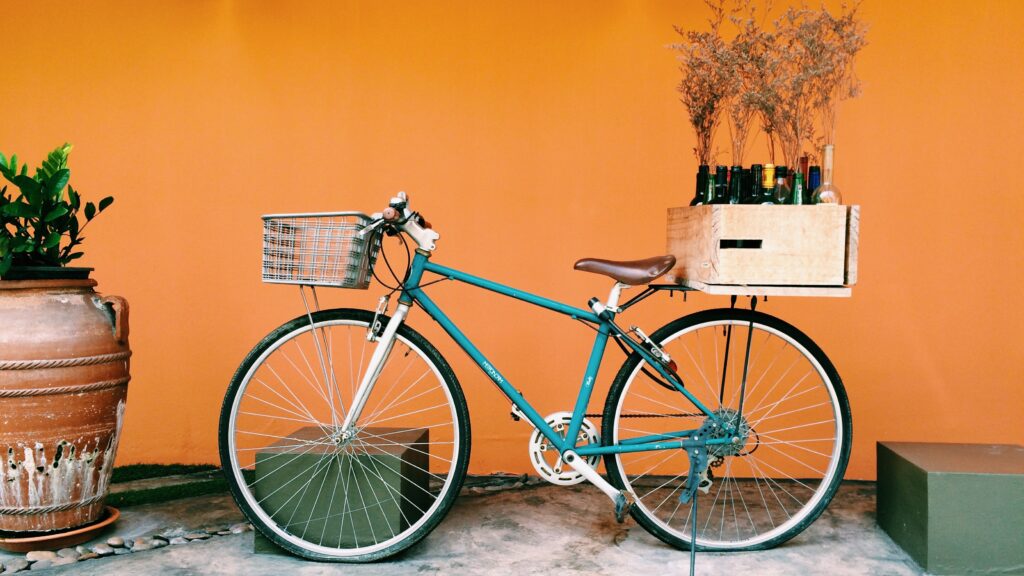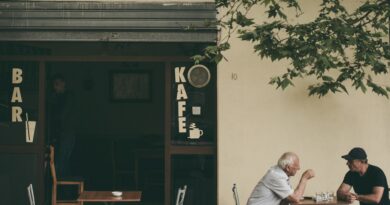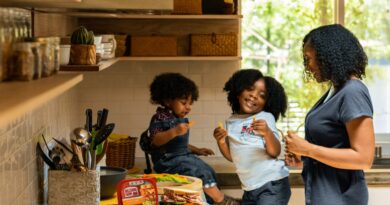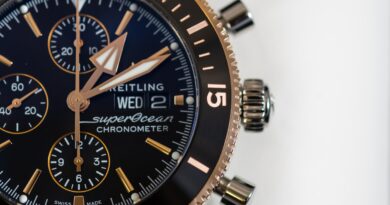Photo by Sagar Rana on Unsplash
Cada pensamento, ação, e sensação muda nossos cérebros. Uma ação, quando repetida com frequência, se torna um hábito. O vídeo começa com uma história interessante. O primeiro fabricante de pasta de dentes nos Estados Unidos precisava convencer a população de que escovar os dentes todos os dias era uma necessidade importante. Como criar este hábito na população? Certamente ele foi bem sucedido, pois escovar os dentes faz hoje parte da rotina de uma grande parte da população da Terra. Quer saber como ele fez isso? Assista ao vídeo para descobrir 😃
| Audio | |
|---|---|
Normal | Slow |
| English Transcript | Tradução |
| Hey smart people, Joe here. | Ei gente esperta, Joe aqui. |
| What if I told you that the reason you had minty-fresh breath this morning was because 100 years ago an advertiser named Claude C. Hopkins was having trouble selling a brand of toothpaste? | E se eu lhe dissesse que o motivo de você ter hálito de menta fresca esta manhã foi porque, há 100 anos, um anunciante chamado Claude C. Hopkins estava tendo problemas para vender uma marca de pasta de dente? |
| He needed to convince people that brushing their teeth should be a daily routine, and back then, it wasn1t for most people. | Ele precisava convencer as pessoas de que escovar os dentes deveria ser uma rotina diária e, naquela época, não era para a maioria das pessoas. |
| In the end he was able to get half the American public to pick up a new behavior and repeat it every single day, and pay money for his toothpaste. | No final, ele conseguiu fazer com que metade do público americano adotasse um novo comportamento e o repetisse todos os dias, e pagasse pela pasta de dente. |
| How did he do it? | Como ele fez isso? |
| By tapping into neuroscience and decoding the awesome power of habits. | Utilizando a neurociência e decodificando o incrível poder dos hábitos. |
| [OPEN] Habits. | [ABRIR] Hábitos. |
| We've all got 'em. | Todos nós temos. |
| You can probably think of a few of your own. | Você provavelmente pode pensar em alguns de sua preferência. |
| I always seem to tap my feet when I'm trying to sit still. | Eu sempre fico batendo os pés quando tento ficar sentado parado. |
| And I find myself biting my nails whenever I'm focused on reading or watching a movie. | E sempre que estou focado em ler ou assistir a um filme eu começo a roer as minhas unhas. |
| I don't consciously think about doing these things. | Não penso conscientemente em fazer essas coisas. |
| That's because I've done them so often that they've become a habit. | É porque tenho feito isso com tanta frequência que se tornaram um hábito. |
| We know habits as things we do automatically; tasks we do subconsciously, like walking or high fiving. | Conhecemos os hábitos como coisas que fazemos automaticamente; tarefas que fazemos inconscientemente, como caminhar ou bater as mãos. |
| And there's a ton of things that technically count as habits, and they can be good or bad. | E há uma tonelada de coisas que contam, tecnicamente, como hábitos, e estas coisas podem ser boas ou ruins. |
| So why do we form habits? | Então, por que formamos hábitos? |
| And how do we learn new ones, or un-learn old ones? | E como aprendemos hábitos novos ou desaprendemos os antigos? |
| If you've ever taken the same path to school or work, then you likely have that pathway burned into your brain. | Se você já fez o mesmo caminho para a escola ou para o trabalho, é provável que tenha esse caminho gravado em seu cérebro. |
| You can probably walk it without really paying attention. | Você provavelmente pode andar sem realmente prestar atenção. |
| Habits are built in a similar way. | Os hábitos são construídos de maneira semelhante. |
| New neural pathways are formed when you repeat a behavior. | Novas vias neurais são formadas quando você repete um comportamento. |
| And the more a brain circuit fires, the easier it becomes for our brain to do whatever that circuit controls, without conscious thought. | E quanto mais um circuito do cérebro dispara, mais fácil se torna para o nosso cérebro fazer o que quer que o circuito controle, sem pensamento consciente. |
| Think back to how you learned to ride a bike. | Pense em como você aprendeu a andar de bicicleta. |
| At first, riding a bike is tough. | No início, andar de bicicleta é difícil. |
| You've got to learn how to pedal and balance and turn all at the same time. | Você precisa aprender a pedalar, equilibrar e girar, tudo ao mesmo tempo. |
| You have to consciously think about each action. | Você tem que pensar conscientemente sobre cada ação. |
| This happens in an area of your brain called the prefrontal cortex, the part associated with complex thought. | Isso acontece em uma área do cérebro chamada córtex pré-frontal, a parte associada ao pensamento complexo. |
| But eventually, after you ride enough, you no longer have to consciously think about each individual action. | Mas, eventualmente, depois de pedalar o suficiente, você não precisa mais pensar conscientemente sobre cada ação individual. |
| Riding a bike has become a habit, and now it's controlled by different parts of your brain. | Andar de bicicleta se tornou um hábito e agora é controlado por diferentes partes do cérebro. |
| One area involved in habitual behavior is the striatum, which actually releases chemicals that inhibit the complex thinking part of your brain for that task. | Uma área envolvida no comportamento habitual é o corpo estriado, que na verdade libera substâncias químicas que inibem o pensamento complexo da parte do cérebro para essa tarefa. |
| This is your brain being efficient. | Este é o seu cérebro sendo eficiente. |
| By turning down your brain's thinking requirements for bike riding, it's free to think other things, like "how exactly do igloos keep you warm?" | Ao diminuir os requisitos de raciocínio do seu cérebro para andar de bicicleta, você fica livre para pensar outras coisas, como "como exatamente os iglus o mantêm aquecido?" |
| Let's go back to Claude Hopkins and his toothpaste scheme. | Voltemos a Claude Hopkins e seu esquema de pasta de dente. |
| Claude realized habits have three key ingredients. | Claude percebeu que os hábitos têm três ingredientes principais. |
| A cue, a behavior, and a reward. | Uma deixa, um comportamento e uma recompensa. |
| A cue is something that triggers a behavior, like how the alarm clock triggers you punching the snooze button, and this is followed by the reward - 9 sweet extra minutes of sleeping in. | Uma deixa é algo que desencadeia um comportamento, como o modo como o despertador faz com que você acione o botão de soneca, e isso é seguido pela recompensa - 9 agradáveis minutos extras de sono. |
| Claude got people thinking about that slimy film on your teeth in the morning, thanks to bacteria that colonize your mouth overnight. | Claude fez as pessoas pensarem naquela película pegajosa nos dentes pela manhã, graças às bactérias que colonizam sua boca durante a noite. |
| The sticky film is the cue that triggers brushing behavior. | O filme pegajoso é a deixa que desencadeia o comportamento de escovação. |
| What was the reward? | Qual foi a recompensa? |
| Claude convinced people this film would make their smile look ugly and a prettier smile was the reward for brushing. | Claude convenceu as pessoas de que esse filme faria seu sorriso parecer feio e um sorriso mais bonito foi a recompensa da escovação. |
| Claude understood that with the right cue and the right reward, you could entice people to do just about whatever behavior you wanted. | Claude entendeu que, com a deixa certa e a recompensa certa, você poderia motivar as pessoas a desenvolverem praticamente qualquer comportamento que desejasse. |
| But what he didn't know was that rewarding a behavior can actually create a craving, and this is what makes habits so strong. | Mas o que ele não sabia é que recompensar um comportamento pode na verdade criar um desejo, e é isso que torna os hábitos tão fortes. |
| Scientists now know that special neurons in the brain can fire and give us chemical rewards. | Os cientistas agora sabem que neurônios especiais no cérebro podem disparar e nos dar recompensas químicas. |
| But what's weird is that once a habit and a reward are tied together in our brain, those reward neurons start firing even before you do the behavior. | Mas o que é estranho é que, uma vez que um hábito e uma recompensa estão ligados em nosso cérebro, esses neurônios de recompensa começam a disparar antes mesmo de você realizar o comportamento. |
| This is what causes craving, and it's why you want popcorn when you go to the movies, why you pick up your bad habits when you see other people doing them, and why habits are so hard to break. | Isso é o que causa o desejo, e é por isso que você quer pipoca quando vai ao cinema, porque você adquire seus maus hábitos quando vê outras pessoas fazendo-os e por que hábitos são tão difíceis de quebrar. |
| Claude knew a prettier smile would be a reward that would make people brush, but he didn't anticipate that over time people would subconsciously start craving the minty tingle that Pepsodent left in their mouths. | Claude sabia que um sorriso mais bonito seria uma recompensa que faria as pessoas escovarem os dentes, mas ele não previu que com o tempo as pessoas iriam inconscientemente começar a desejar o formigamento de hortelã que Pepsodent deixava em suas bocas. |
| People's brains actually started to crave toothbrushing. | Os cérebros das pessoas realmente começaram a desejar escovar os dentes. |
| So how can you train yourself to pick up a new habit, like eating an apple a day. | Então, como você pode treinar para adquirir um novo hábito, como comer uma maçã por dia. |
| And if you've got a bad habit, can you break it, or are you stuck with it forever? | E se você tem um mau hábito, pode quebrá-lo ou ficará preso a ele para sempre? |
| Scientists used to think that our brains didn't change all that much once we reached adulthood, like concrete once it's solidified. | Os cientistas costumavam pensar que nossos cérebros não mudavam tanto assim que chegamos à idade adulta, como o concreto depois de solidificado. |
| But it turns out your brain is much more like clay - it's a super flexible organ. | Mas acontece que seu cérebro é muito mais parecido com argila - é um órgão super flexível. |
| The chemistry of your brain is constantly changing as you go about your day, in response to everything from learning to moving to hunger. | A química do seu cérebro muda constantemente ao longo do dia, em resposta a tudo, desde aprender até passar fome. |
| These chemical releases are short lived, but over time, if the same behaviors are repeated, the physical structure of the brain is actually changed. | Essas liberações químicas duram pouco, mas com o tempo, se os mesmos comportamentos forem repetidos, a estrutura física do cérebro é realmente alterada. |
| You create new neural pathways. | Você cria novas vias neurais. |
| And because the neural network has changed, so does the way the information flows. | E como a rede neural mudou, também mudou a forma como as informações fluem. |
| When a behavior is repeated often enough, a habit is formed. | Quando um comportamento é repetido com bastante frequência, um hábito é formado. |
| There's a famous idea that a new skill is learned by putting in 10,000 hours of work, but it's not that simple. | Existe uma ideia famosa de que uma nova habilidade é aprendida com 10.000 horas de trabalho, mas não é tão simples. |
| The amount of time differs hugely between tasks and between people. | A quantidade de tempo difere enormemente entre as tarefas e entre as pessoas. |
| What's for sure is that when it comes to making a habit, whether it's learning guitar or meditation, there's simply no substitute for repetition. | O que é certo é que, quando se trata de criar um hábito, seja aprender violão ou meditação, simplesmente não há substituto para a repetição. |
| The reason bad habits are so hard to break is because you have literally woven new neural networks into your brain. | A razão pela qual os maus hábitos são tão difíceis de quebrar é porque você literalmente teceu novas redes neurais em seu cérebro. |
| That doesn't go away overnight. | Isso não vai embora de uma hora para a outra. |
| So give yourself a break. | Portanto, tenha paciência. |
| And if you're trying to change a habit, know that it's usually best to try and replace bad behavior with a new behavior instead of just trying to erase the pattern altogether. | E se você está tentando mudar um hábito, saiba que geralmente é melhor tentar substituir o mau comportamento por um novo comportamento, em vez de apenas tentar apagar o padrão por completo. |
| The good thing is that now you know you have the power to change your brain. | O bom é que agora você sabe que tem o poder de mudar seu cérebro. |
| It's as easy as brushing your teeth. | É tão fácil quanto escovar os dentes. |
| And if you haven't already made it a habit? Stay Curious. | E se você ainda não criou o hábito? Permaneça curioso. |
Contagem de palavras
A tabela abaixo exibe as palavras encontradas neste vídeo bem como o número de vezes em que aparecem.
Veja também: Para que serve esta tabela?
| Freq. | Palavra | Freq. | Palavra | Freq. | Palavra |
|---|---|---|---|---|---|
| 39 | a | 38 | the | 31 | to |
| 28 | you | 28 | and | 27 | that |
| 18 | is | 16 | your | 14 | of |
| 14 | brain | 12 | behavior | 11 | in |
| 11 | habits | 10 | people | 10 | it |
| 9 | it's | 9 | habit | 9 | do |
| 8 | so | 8 | reward | 8 | new |
| 8 | for | 8 | are | 7 | this |
| 7 | think | 7 | or | 7 | how |
| 7 | claude | 7 | can | 7 | but |
| 6 | when | 6 | we | 6 | was |
| 6 | like | 6 | if | 6 | have |
| 6 | about | 5 | what | 5 | know |
| 5 | he | 5 | by | 5 | bad |
| 5 | as | 4 | would | 4 | with |
| 4 | why | 4 | time | 4 | things |
| 4 | neural | 4 | I | 4 | got |
| 4 | go | 4 | cue | 4 | brushing |
| 4 | break | 4 | bike | 4 | because |
| 4 | actually | 3 | you've | 3 | up |
| 3 | trying | 3 | triggers | 3 | toothpaste |
| 3 | thinking | 3 | there's | 3 | their |
| 3 | teeth | 3 | smile | 3 | same |
| 3 | riding | 3 | pick | 3 | our |
| 3 | once | 3 | now | 3 | learn |
| 3 | into | 3 | film | 3 | didn't |
| 3 | day | 3 | craving | 3 | consciously |
| 3 | change | 3 | be | 3 | back |
| 3 | an | 3 | all | 2 | yourself |
| 2 | work | 2 | without | 2 | what's |
| 2 | whatever | 2 | way | 2 | thought |
| 2 | these | 2 | then | 2 | them |
| 2 | tasks | 2 | subconsciously | 2 | start |
| 2 | scientists | 2 | right | 2 | ride |
| 2 | repeated | 2 | repeat | 2 | releases |
| 2 | reason | 2 | probably | 2 | prettier |
| 2 | power | 2 | pathways | 2 | part |
| 2 | overnight | 2 | over | 2 | other |
| 2 | ones | 2 | on | 2 | often |
| 2 | no | 2 | neurons | 2 | my |
| 2 | much | 2 | morning | 2 | more |
| 2 | minty | 2 | make | 2 | learning |
| 2 | learned | 2 | just | 2 | I'm |
| 2 | hopkins | 2 | his | 2 | has |
| 2 | hard | 2 | good | 2 | give |
| 2 | formed | 2 | enough | 2 | each |
| 2 | doing | 2 | create | 2 | complex |
| 2 | circuit | 2 | chemical | 2 | changed |
| 2 | brains | 2 | between | 2 | become |
| 2 | at | 2 | area | 2 | action |
| 1 | you're | 1 | years | 1 | woven |
| 1 | which | 1 | whether | 1 | whenever |
| 1 | we've | 1 | weird | 1 | watching |
| 1 | wasn | 1 | warm | 1 | wanted |
| 1 | want | 1 | walking | 1 | walk |
| 1 | usually | 1 | used | 1 | us |
| 1 | understood | 1 | un | 1 | ugly |
| 1 | turns | 1 | turning | 1 | turn |
| 1 | try | 1 | trouble | 1 | train |
| 1 | tough | 1 | toothbrushing | 1 | ton |
| 1 | told | 1 | together | 1 | tingle |
| 1 | tied | 1 | three | 1 | those |
| 1 | thing | 1 | they've | 1 | they |
| 1 | that's | 1 | thanks | 1 | technically |
| 1 | task | 1 | tapping | 1 | tap |
| 1 | taken | 1 | t | 1 | sweet |
| 1 | sure | 1 | super | 1 | substitute |
| 1 | stuck | 1 | structure | 1 | strong |
| 1 | striatum | 1 | still | 1 | sticky |
| 1 | stay | 1 | started | 1 | special |
| 1 | something | 1 | solidified | 1 | snooze |
| 1 | smart | 1 | slimy | 1 | sleeping |
| 1 | skill | 1 | sit | 1 | single |
| 1 | simply | 1 | simple | 1 | similar |
| 1 | should | 1 | short | 1 | selling |
| 1 | seem | 1 | see | 1 | school |
| 1 | scheme | 1 | routine | 1 | rewards |
| 1 | rewarding | 1 | response | 1 | requirements |
| 1 | replace | 1 | repetition | 1 | really |
| 1 | realized | 1 | reading | 1 | reached |
| 1 | putting | 1 | punching | 1 | public |
| 1 | prefrontal | 1 | popcorn | 1 | physical |
| 1 | pepsodent | 1 | people's | 1 | pedal |
| 1 | paying | 1 | pay | 1 | pattern |
| 1 | pathway | 1 | path | 1 | parts |
| 1 | own | 1 | out | 1 | organ |
| 1 | open | 1 | one | 1 | old |
| 1 | not | 1 | neuroscience | 1 | networks |
| 1 | network | 1 | needed | 1 | named |
| 1 | nails | 1 | myself | 1 | moving |
| 1 | movies | 1 | movie | 1 | mouths |
| 1 | mouth | 1 | most | 1 | money |
| 1 | minutes | 1 | meditation | 1 | making |
| 1 | makes | 1 | made | 1 | look |
| 1 | longer | 1 | lived | 1 | literally |
| 1 | likely | 1 | let's | 1 | left |
| 1 | knew | 1 | key | 1 | keep |
| 1 | joe | 1 | I've | 1 | involved |
| 1 | instead | 1 | inhibit | 1 | ingredients |
| 1 | information | 1 | individual | 1 | igloos |
| 1 | idea | 1 | hunger | 1 | hugely |
| 1 | hours | 1 | high | 1 | hey |
| 1 | here | 1 | having | 1 | haven't |
| 1 | happens | 1 | half | 1 | had |
| 1 | habitual | 1 | guitar | 1 | get |
| 1 | from | 1 | fresh | 1 | free |
| 1 | form | 1 | forever | 1 | followed |
| 1 | focused | 1 | flows | 1 | flexible |
| 1 | fiving | 1 | first | 1 | firing |
| 1 | fires | 1 | fire | 1 | find |
| 1 | few | 1 | feet | 1 | famous |
| 1 | extra | 1 | exactly | 1 | everything |
| 1 | every | 1 | ever | 1 | eventually |
| 1 | even | 1 | erase | 1 | entice |
| 1 | end | 1 | 'em | 1 | efficient |
| 1 | eating | 1 | easy | 1 | easier |
| 1 | down | 1 | don't | 1 | done |
| 1 | doesn't | 1 | does | 1 | differs |
| 1 | different | 1 | did | 1 | decoding |
| 1 | daily | 1 | curious | 1 | crave |
| 1 | count | 1 | could | 1 | cortex |
| 1 | convinced | 1 | convince | 1 | controls |
| 1 | controlled | 1 | constantly | 1 | conscious |
| 1 | concrete | 1 | comes | 1 | colonize |
| 1 | clock | 1 | clay | 1 | chemistry |
| 1 | chemicals | 1 | changing | 1 | causes |
| 1 | called | 1 | c | 1 | button |
| 1 | burned | 1 | built | 1 | brush |
| 1 | breath | 1 | brand | 1 | brain's |
| 1 | biting | 1 | best | 1 | being |
| 1 | behaviors | 1 | before | 1 | becomes |
| 1 | balance | 1 | bacteria | 1 | awesome |
| 1 | away | 1 | automatically | 1 | attention |
| 1 | associated | 1 | apple | 1 | anticipate |
| 1 | amount | 1 | american | 1 | always |
| 1 | altogether | 1 | already | 1 | alarm |
| 1 | ago | 1 | after | 1 | advertiser |
| 1 | adulthood | 1 | able |










